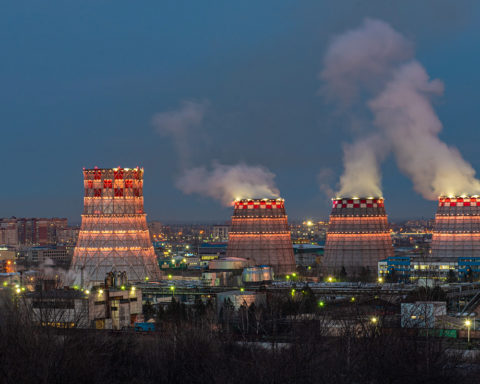Elena TELEGINA Associate member of RAS,
D. Sc. Economics, Gubkin University
e-mail: meb@gubkin.ru
Abstract. Transformation of global economy and accelerated development of renewables as well as coronavirus pandemic and deep world economic crisis facilitate the appearance of new educational concepts especially in the field of business education.
Keywords: transformation of global economy, renewables development, new business education concepts, quantorium.
The indisputable postulates of today are the global transformation of energy markets, the rapid growth of renewable energy and a long-term sustained decline in demand for fossil fuels. Oil and gas giants that are losing capitalization are forced not only to adapt their strategies to the new realities, but also to transit to a new management model based not on the familiar and long-established vertically integrated structure, but on the use of network models of business organization, expansion of horizontal ties, the use of blockchain and digital platforms. Business diversification with the expansion and increase in the segments of alternative and green energy inevitably turns the world’s majors into energy holdings looking for new market niches in the face of tough price and product competition.
The aggravation of the geopolitical situation and contradictions in international relations, the crisis of the world economy and the use of the policy of sanctions as an instrument of competition for energy markets force both countries and companies to adapt to challenges and reduce risks. First of all, this concerns Russia, which is restricted by international sanctions affecting the development of both the entire country and its energy complex. Aggressive US policy, rigidly promoting American LNG to foreign markets, consistently complicates the prospects for the activities of Russian energy companies, primarily on traditional European sites [1].
The coronavirus pandemic caused an extremely destructive impact on the educational environment, transferring almost all categories of students to online classes. This also affected business education, many companies and people were not ready to undergo distance learning in MBA programs. The world is again talking about the end of business schools and the collapse of the existing education system.
However, all the cataclysms and transformations that are rapidly occurring today are accelerating the emergence of new development models, helping both business and education system to enter the digital world of the future faster.
Today, the main skills and competencies are – the ability to work with
numerical information, the ability to operate with large amounts of data,
comprehensive analytical approach, flexibility and speed in decision-making,
willingness to take risks, developed communication skills, fluent English,
knowledge of information technology.
Currently, most companies are developing their own concept of targeted training that meets the objectives of continuous corporate professional education and determines the goals and main corporate approaches to organizing targeted training in accordance with corporate development programs.
At the same time, the most important feature in forming training programs is compliance with professional standards applied in the industry, and a differentiated approach to training specialists, depending on the level of qualifications and preparedness, the prospects for their future activities in the company, as well as taking into account the development of their professional, managerial and personal and business competencies,

The pandemic affected the retraining and vocational education sector
Source: MUEC
necessary to ensure high performance in the face of uncertainty and changing business strategies.
The implementation of targeted training requires a network principle for constructing methods of additional vocational education, which should ensure the complementarity of educational programs of various educational institutions (domestic and foreign universities, corporate educational centers) and also include industrial and educational internships, trainings, simulation games, seminars for studying the best practices, master classes by leading industry experts and other forms of training.
The development of flexible skills – soft skills – (communication, self-management, effective thinking, time management, leadership qualities, personal growth, creativity in solving tasks, etc.) occurs in parallel with the use of professional experience – hard skills – which implies the expansion of the horizon of already acquired competencies, the formation of a global vision of the leading trends in the development of world energy and the functioning of the company in a turbulent business environment [2].
The task of business education in the new reality is to focus on the leading trends in the development of energy companies in the transforming markets. New challenges and risks of the energy business are analyzed and assessed by leading Russian and foreign experts during the modules in an interactive format, which makes it possible to form a new pool of ideas aimed at introducing progressive forms and methods of managing the energy business in accordance with then-current requirements.
Based on our experience, a new approach to learning can be based on the idea of “quantorium”: learning takes place in accordance with the innovative technology of STEAM education (science, technology, engineering, art, math), which combines interdisciplinary, creative and applied approaches in training, as well as integrating all disciplines into a single training scheme by performing an integrated group project, while setting tasks for such a project is based on the already existing experience in synthesizing large amounts of information to determine the leading trends in FEC development.
The project groups are formed according to the principle of
complementarity (that is, complementarity, inclusion of students with different
professional experience, skills, competencies, types of thinking in order to
create a dynamic and creative environment). Breaking up students into groups to
complete project tasks intensifies team cohesion to achieve the ultimate goal,
develops teamwork skills, and contributes to the maximum disclosure of personal
potential.
In the course of training, students can be divided into “quanta” (creative laboratories) in areas for the preparation of final projects of the future, such as Digital World, Green World, Gas World, Decentralized World, etc.
Each “quantum” is a separate energetic society created by the students themselves. Each work begins with a problematic situation formed on the basis of the thematic field of the “quantum”, within which the task is logically solved – from analyzing the problem to creating a holistic picture.
During the implementation of the project, participants will need to show maximum creativity in order to present their project in an original way. The work is carried out using the latest methods and visualization tools (multimedia products, video, installations, etc.). Each module contains the principles of mastering modern methods of interdisciplinary research by students:
Such approach aims at:
– developing a systemic style of thinking among students;
– developing creative and critical thinking skills (solving problems of any complexity using non-standard methods);
– developing teamwork and self-presentation skills;
– developing criticality in the perception and assessment of information by the students;
– forming students’ readiness to participate in replication studies to determine the degree of reliability and accuracy of the results obtained and recommendations formulated on their basis;
– involving students, after passing the module, into real research projects implemented on the basis of “creative laboratories”.
Such training will be a kind of bridge connecting the educational process, career and further professional growth of students.
All this allows to take students out of the “comfort zone”, activate their abilities within the framework of the “quantorium” and obtain an effective learning result that systematically integrates all the necessary skills and competencies and allows them to start from a high level of training, opening the horizons of strategic analysis and large-scale decisions in a complex, a high-risk and highly uncertain transforming business environment.

Source: yatsusimnetcojp / Pixabay.com
Peculiarities of training the masters of business administration at the International School of Business at Gubkin University is the specialization of our programs specifically on the topic of transformation of energy markets, the specifics of the energy transition, risk management accompanying such a transformation, and the formation of flexible strategies aimed at adapting to new conditions and the transformation of non-state corporations into energy companies.
References
1. Цифровая экономика и новый энергетический ландшафт: Монография / Под общей редакцией члена-корреспондента РАН, профессора Е. А. Телегиной. – М.: Издательский центр РГУ нефти и газа (НИУ) имени И. М. Губкина, 2020. 297 с.
2. Телегина Е. А., СтуденикинаЛ. А, ТыртышоваД. О. Приоритет развития новых компетенций в турбулентной бизнес-среде: опыт сетевой программы «Нефтегазотрейдинг» – новая модель образования. Проблемы экономики и управления нефтегазовым комплексом. 2020, № 2. С. 30–33.







